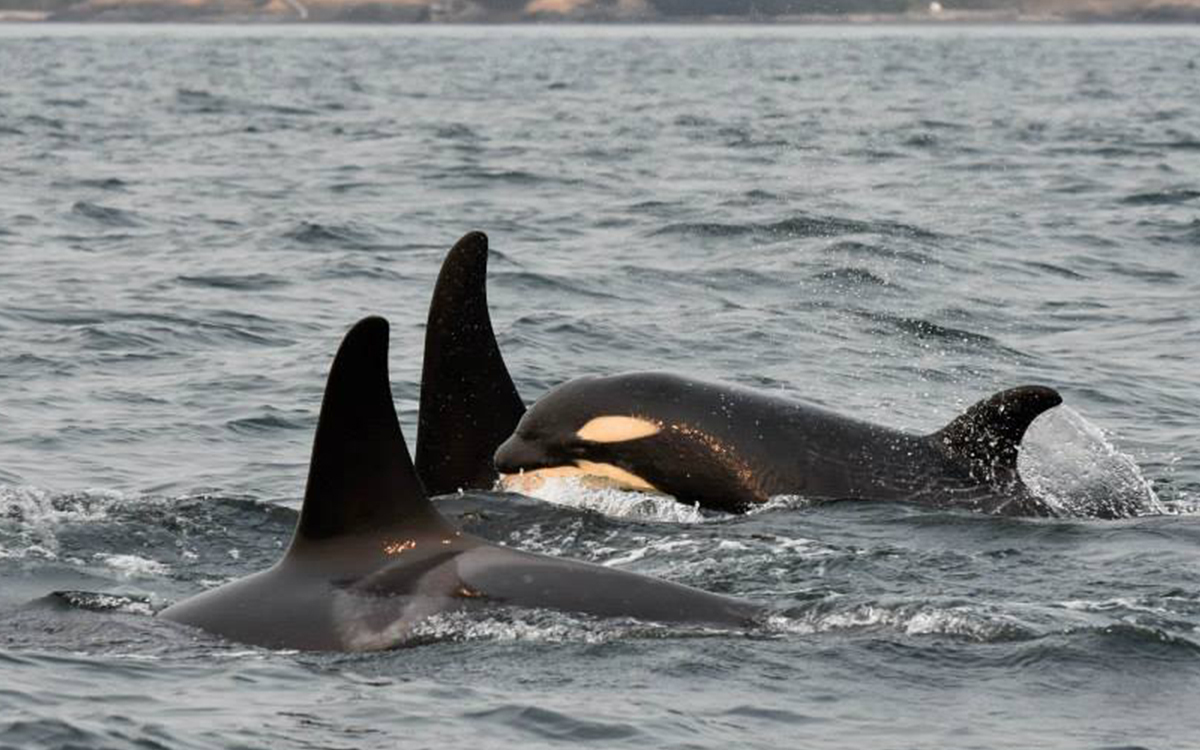

Emergency for Scarlet, the youngest orca of the clan J is dying from starvation!
A little angel is dying before our eyes, surrounded by her mother Slick (J16) and her big brother Echo (J42). Scarlet is not sick. Finally, though… She is sick from certain human aggressions on her planet, this blue planet that we all share.
A population weakened by the captivity industry
Scarlet (J50)’s family have lived here in Puget Sound, off Seattle and Vancouver for hundreds of years. In the 70s, armed men came, hungry for money, to capture these resident orcas, easy to track down. Nets, fast boats, dynamite, 13 of them were captured and sent to dolphinariums. How many died during these indescribably violent hunts ? Lolita was one of those little ones captured and taken away… Now after 48 years, still going around in circles under the tropical sun of Miami.
Their super pod of three family clans could never really recover, despite their solidarity, despite the active and benevolent watch from their matriarch Granny, who died in January 2017 at the age of 105. Granny had experienced hardships, catches from industry, pollution, tankers and fishermen… But the worst was yet to come: to see her grand children die from hunger and thirst. A slow agony, a constant stress. If the disappearance of this species is a tragedy for all of us, then it is above all a martyrdom for the individuals concerned.
Scarlet is in immediate danger
Scarlet, is the last born of the J pod, she is still a child, but her birth dates back to 2014. Granny had watched over her as a godmother for her first three years. If only she knew… At four, Scarlet should be growing. She shows all the signs of severe dehydration! One of the specificities of cetaceans is to extract from their solid food the water they need. Now we can discern the shape of the skull under the skin of Scarlet, to the point that we are, like the specialists, extremely worried about her survival, estimated in days if nothing is done. She urgently needs salmon! Scarlett is dying… from hunger and thirst.
The situation is all the more dramatic because ten days ago her clan had just lost a little one having lived only half an hour after its birth; her mourning mother, Tahlequah (J35) and her group cannot bring themselves to leave the body of this lifeless baby, taking turns to carry her since then. The pregnancies of orca mothers are no longer viable. The main cause: nutritional stress.
Overfishing and dams are the cause
Overfishing and large dams are killing chinook salmon, large fish that live in the northern Pacific Ocean and which feed the resident orcas of the Salish Sea… some even say they have already disappeared, as their numbers are now very small…
There are more than eight dams on the Snake River. For the specialists, to each dam, we can lose up to 10% of the chinook salmons. But for these fish, a long journey is necessary for their reproduction. It is a pilgrimage to the places of their birth. But this upriver journey to the spawning ground is so difficult that they lose their reserves, their bodies are transformed and the future parents die, exhausted, as soon as they have spawned. For them too, the Salish Sea becomes their tomb…
To save these resident orcas is to repair a little of this Earth that is suffering. Because the return of salmon would be good news for these fish, kings of the rivers and the ocean of the Pacific coast. Biologist Ken Balcomb, head of the Centre for Whale Research, of which One Voice is a member, has devoted his entire life to the South Resident Killer Whales, the SRWK, as he calls them; he has been studying them for 43 years. And when he goes out to sea with his boat, they come to greet him by bringing him fish, they who do not already have enough to survive. Because these orca people are not just only majestic, but, they are the best thing in all of us, this small patch of true and fragile humanity that we should stand up and support while there is still time.
Ken Balcomb fights tirelessly for the reopening of the dams. Let’s all support his call on social networks using #FreeTheSnake in our publications on this topic!
Photo: Slick (J36) and Echo (J42) surrounding Scarlet (J50) on July 2015.
Credit: Heather MacIntyre / Nature’s Keeper Photography / Maya’s Legacy Whale Watching.